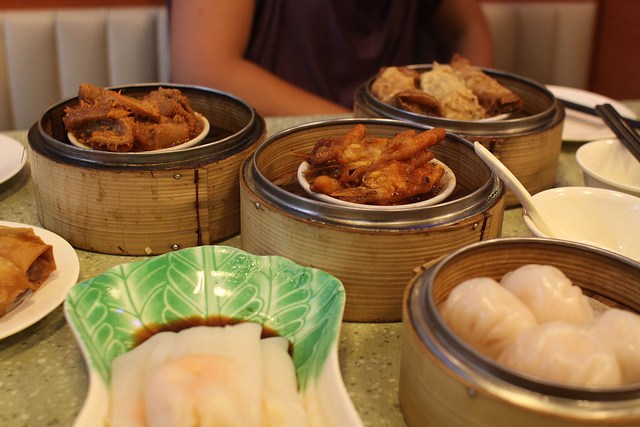
Yum Cha (tea tasting) dishes. Photo © Yi Chen, licensed Creative Commons Attribution.
Much of Hong Kong life seems to revolve around the dining table and communal eating is essential to everything from family life to concluding business deals. Evening meals and business lunches are often done in groups and food is shared, as evidenced by the spinning tables used in restaurants to deliver grand feasts to up to eight people. Communal dining is a highly ritualized experience; there are a few rules and customs worth following to make sure you end up with food—and not your foot—in your mouth. Don’t be afraid to get your hands dirty when dining.Whoever is oldest, or at business meetings the most senior, acts as the host. You should wait for the host to sit at the head of the table and invite you to sit, before taking your seat. It’s normal for the host to order for everyone and although they will usually ask for suggestions, it’s best to keep your arm down. It’s considered good form and food face to let them do the ordering. In general, a good host will not order anything normally seen between the pages of National Geographic, but there are occasions when an honor meal will be served, usually involving something rare, pricy, and potentially displeasing to a Westerner’s palate. Shark Fin soup is the most popular and fairly inoffensive, at least to the taste buds. Unfortunately, there is little room here to escape eating without causing offence. Health reasons or allergies are the best excuse, although both can be a tough sell for the snake course special. Tea and water are usually provided as communal drinks and, at business dinners, wine or a spirit, though rarely beer.Once the food arrives, resist the temptation to spear the nearest piece of meat with your chopsticks. instead, wait for the host to dig in. Food generally comes in small bowls, along with side dishes of vegetables, various sauces, and rice. Health scares mean communal chopsticks are now used to serve food. It’s best not to treat the table as a roulette wheel and instead wait for the host to spin the table and deliver a different set of food within striking distance of your chopsticks. Don’t be afraid to get your hands dirty when dining. Slurping, chomping, and lip-smacking are considered celebrations of the quality of food and you can feel free to lift soup bowls to your lips to lap up the leftovers or suck any bones dry—everybody else will. Next to your bowl you’ll be provided with a small plate to deposit any bones, gristle, or other leftovers. Avoid sticking chopsticks upright into rice, which signifies death, or laying them across the top of your bowl. Instead, set them to the side on your plate.
The bill is the responsibility of the host and splitting the bill is very rare. Instead, you can reciprocate the offer of a meal sometime in the future, if amongst friends.
Excerpted from the First Edition of Moon Living Abroad in Hong Kong.